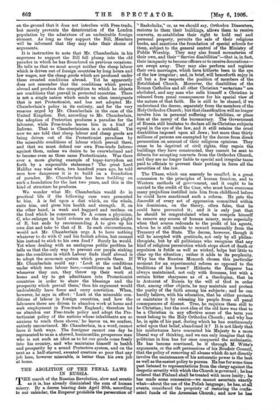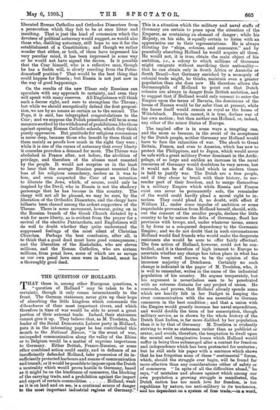THE ABOLITION OF THE PENAL LAWS IN RUSSIA.
91HE march of the Russian Revolution, slow and erratic as it is, has already diminished the sum of human misery. By a decree bearing date April 30th, according to our calendar, the Emperor prohibits the persecution of Raskolniks," or, as we should say, Orthodox Dissenters, restores to them their buildings, allows them to receive converts, re-establishes their right to hold real and personal property, permits the sale of their religions books, and sanctions the foundation of special schools for them, subject to the general control of the Ministry of Public Worship. They may also found monasteries of their own, and their " Service disabilities"—that is, in fact, their incapacity to become officers or to receive decorations— are swept away. They may also perform and register their own marriages, which have hitherto been in the eye of the law irregular ; and, in brief, will henceforth enjoy in all but a few respects the position of members of the Established Church. Moreover, the disabilities of the Roman Catholics and all other Christian " sectarians " are abolished, and any man who calls himself a Christian is released from penal consequences for his special view of the nature of that faith. He is still to be classed, if we understand the decree, separately from the members of the Holy Orthodox Church; but that classification will no longer involve him in personal suffering or liabilities, or place him at the mercy of the bureaucracy. The Government of Russia still hesitates to declare all its Christian subjects equal in the eye of the law, and it still retains the cruel disabilities imposed upon all Jews ; but more than thirty millions of persons are exempted by the decree from direct persecution on account of their religious opinions. They cease to be deprived of civil rights, they regain the buildings they have constructed, they cannot be sent to Siberia for accepting converts from the Orthodox Church, and they are no longer liable to special and irregular taxes paid to officials to prevent their putting in force all the severities of the law.
The Ukase, which can scarcely be recalled, is a great concession to the principles of human freedom, and to Western methods of government, and it ought to be carried to the credit of the Czar, who must have overcome many prejudices instilled into him from childhood before he could have sanctioned such a reform. He gets the discredit of every act of oppression committed within his dominions, on the theory, often false, that he could have prevented it; and it is only just that he should be congratulated when he compels himself to remove any source of human misery, more especially when that source redounds to the profit of his agents, whom he is still unable to reward reasonably from the Treasury of the State. The decree, however, though it will be accepted with gratitude, not only by all philan- thropists, but by all politicians who recognise that any kind of religious persecution which stops short of death or expulsion is futile as well as wicked, helps but little to clear up the situation ; rather it adds to its perplexity. Why has the Russian Monarch chosen this particular moment for an experimental reform so opposed to the traditions of his house ? Hitherto the Emperor has always maintained, not only with firmness, but with a certain bitter sharpness as of a theologian, that he is Autocrat of Russia by the will of God in order that, among other objects, he may maintain and protect the purity of the faith among his subjects ; and he can hardly believe, with his education, that he either protects or maintains it by releasing his people from all penal consequences of dissent. True, he requires them still to be Christian ; but the root-idea of the old laws was that to be a Christian in any effective sense of the term you must belong to the Holy Orthodox Church ; and why has he, in spite of his past, during which he has continuously acted upon that belief, abandoned it ? It is not likely that his misfortunes have converted his Majesty to a more liberal way of thinking, and we can only imagine that the politician in him has for once conquered the ecclesiastic. He has become convinced, be it through M. Witte's arguments, or the soft persuasions of his Boudoir Council, that the policy of removing all abuses which do not directly involve the maintenance of his autocratic power is the best as well as the easiest policy to pursue. He has for some time past listened to representations from the clergy against the despotic severity with which the Church is governed ; he has ordered that Finland shall be treated with more lenity; he has made some concession—we cannot ascertain exactly what—about the use of the Polish language; he has, at all events, considered the propriety of restoring the confis- cated funds of the Armenian Church; and now he has liberated Roman Catholics and Orthodox Dissenters from a persecution which they felt to be at once bitter and insulting. That is just the kind of concession which the devotees of political autocracy would suggest, as would also those who, disliking autocracy, still hope to use it for the establishment of a Constitution ; and thoUgh we rather wonder that either, or both, of them have impressed his very peculiar mind, it has been impressed in some way or he would not have signed the decree. Is it possible that the Czar himself, who is a reflective man, though he has a feeble will, is slowly receding from the Pobie- donostzeff position ? That would. be the best thing that could happen for Russia ; but Russia is not just now in the way of good. happenings.
On the results of the new Ukase only Russians can speculate with any approach to certainty, and even they will speak with many reserves. All Englishmen will think such a decree right, and sure to strengthen the Throne ; but while we should energetically defend the first proposi- tion, we are by no means so certain as to the second. The Pope, it is said, has telegraphed congratulations to the Czar ; and we suppose the Polish priesthood will be in some measure soothed by the withdrawal of prohibitions, like those against opening Roman Catholic schools, which they think purely oppressive. But gratitude for religious concessions is never deep, because those who benefit by them think of them mainly as proofs how much in the right they were ; while it is one of the curses of autocracy that every liberty it concedes provokes a demand for more. The Throne was abolished in France after, not before, the abolition of privilege, and therefore of the abuses most resented by the people. It would. not surprise us in the least to hear that the average Russian peasant resented the loss of his religious ascendency, useless as it was to him, and even suspected the Czar of an intention to liberate the Jews, which, of course, could only be inspired by the Devil, who in Russia is not the shadowy personage that he has become in this country. The clergy will not all be pleased, we may be sure, by the liberation of the Orthodox Dissenters, and the clergy have hitherto been classed among the ardent supporters of the Throne. There is some movement, however, going on in the Russian branch of the Greek Church dictated by a wish for more liberty, as is evident from the prayer for a revival of the elective Patriarchate, and Englishmen will do well to doubt whether they quite understand the suppressed feelings of the most silent of Christian Churches. Perhaps the best conclusion, after all, is to think that a good deed must have good consequences ; and the liberation of the Raskolniks, who are eleven millions, and the Roman Catholics, who are sixteen millions, from penal laws, some of which are as savage as our own penal laws once were in Ireland, must be a thoroughly good deed.











































 Previous page
Previous page